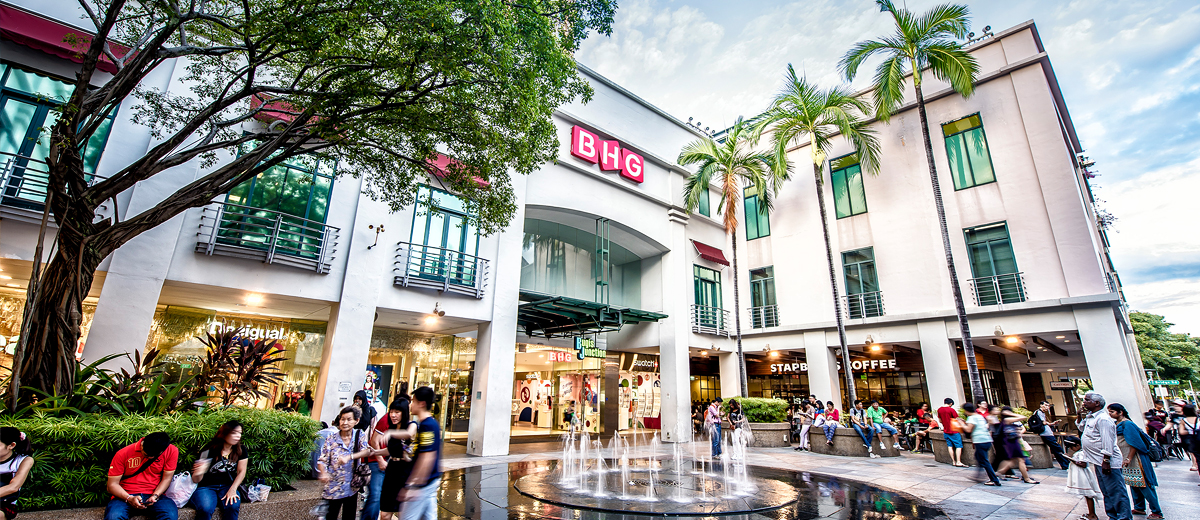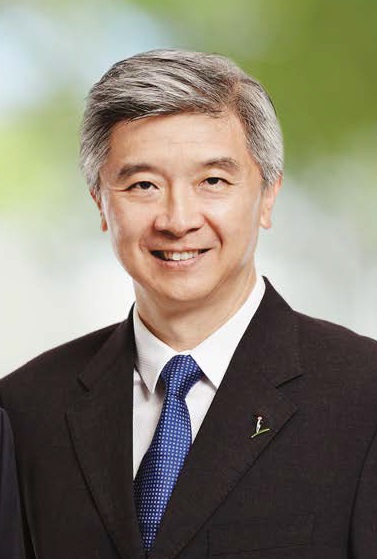 This article by Jennifer Tan (left, Director, Research & Products, Equities & Fixed Income, at the Singapore Exchange) was published in SGX's kopi-C: the Company brew series on 1 April 2016. The article is republished with permission.
This article by Jennifer Tan (left, Director, Research & Products, Equities & Fixed Income, at the Singapore Exchange) was published in SGX's kopi-C: the Company brew series on 1 April 2016. The article is republished with permission.
As the saying goes, he who dares, wins. It is this adventurous streak that defines Wilson Tan, Chief Executive Officer of CapitaLand Mall Trust Management, which manages CapitaLand Mall Trust Ltd (CMT), Singapore’s first real estate investment trust (REIT).
The spirit of enterprise is key to pushing one’s limits. |
The Counterintuitive Call
CMT, which listed on Singapore Exchange in July 2002, is the largest REIT by market capitalisation – at S$7.5 billion. It owns and invests in income-producing assets predominantly used for retail purposes in the city-state. The trust averaged an annualised distribution yield of 5.3% over the last five years.
CMT’s portfolio comprises nearly 3,100 leases by local and international retailers, with a committed occupancy level of 97.6%. It owns 16 quality shopping malls strategically located in suburban areas and downtown Singapore. It also holds 122.7 million units in CapitaLand Retail China Trust (CRCT), the first China retail REIT listed on SGX in December 2006. As at end-2015, CMT has a deposited property size or total asset value of about S$11.1 billion.
|
We need to venture out and try. If we do not try, we will never be able to push boundaries, and without pushing boundaries, we will not achieve new possibilities. - Wilson Tan CapitaLand Mall Trust |
CapitaLand Mall Trust Management is an indirect wholly owned subsidiary of CapitaLand Ltd.
Tan believes venturing beyond one’s comfort zone can open up new possibilities for the REIT.
“We must all learn to be counterintuitive,” he said.
One example is how CMT revamped the retail concept for IMM Building, located in Jurong East.
“Many people say Singapore is too small for an outlet mall to succeed. If we had remained conditioned by what we have seen in the past, it would not have been possible for us to turn IMM into the largest outlet mall here,” he noted.
Singapore’s Grande Dame of IT and telecoms retail, Funan DigitaLife Mall, which will be shut for redevelopment from July, is another case in point. The vision for the new integrated development comprises a mall that is centred on a holistic consumer experience, possibly encompassing theatres, performances, shopping, art, as well as food and beverage.
“We need to venture out and try. If we do not try, we will never be able to push boundaries, and without pushing boundaries, we will not achieve new possibilities,” he added.
Adapting to constantly changing trends is also one of Tan’s guiding principles.
Having held the posts of Managing Director of NEC Asia Pte Ltd and Group CEO of Singapore Post Ltd between 2007 and 2010, he is familiar with the breakneck pace of change in the technology services industry.
“It’s that need to live on the edge, to continually be relevant, which I have internalised over the years,” said Tan, who holds a Bachelor of Arts degree in Economics from the National University of Singapore.
| ♦ Tale of Two Strategies | |
|
This is particularly pertinent for CMT, as it grapples with a sluggish domestic economy and an uncertain global outlook.
For investment properties to continue growing income for the REIT, they need to be constantly renewed and refreshed through asset enhancement initiatives (AEIs), Tan said. |
Downside Risks
Meanwhile, risks from slowing domestic growth and the potential rise in interest rates this year cannot be ignored, Tan said.
There is no refinancing due at CMT level in 2016. The management is working with CapitaLand Commercial Trust Management Ltd for the refinancing of RCS Trust’s debts due this year. RCS Trust owns Raffles City Singapore, in which CMT has a 40% stake.
| Stock price | $1.925 |
| 52-week range | $1.87 - $2.22 |
| Market cap | S$6.8 billion |
| PE (ttm) | 14.6 x |
| Dividend yield | 5.77% |
| Source: SGX StockFacts | |
In 2009 and 2011, CMT had high debt towers of around S$1 billion due for refinancing, and 100% of its assets were secured then.
Not only did this provide less financial flexibility, the larger quantum due for refinancing also posed higher risks, as any spike in interest rates meant a significant portion of the trust’s income would be required to service the debt.
Management has since implemented strategies to mitigate any significant jump in rates. Since 2009, management has focused on reducing CMT’s borrowings due for refinancing in any one year to about S$500 million, which was more in line with the REIT’s distributable income, he noted.
It also began diversifying its funding sources by tapping on different investor bases, including retail bonds and currencies. Most of the funds raised were fixed-rate, and any foreign currency debts were swapped into Singapore dollars in terms of interest payments and the principal.
CMT has taken advantage of low swap rates over the last few years to issue notes of longer tenor, thereby extending the maturity of its borrowings.
“Currently, about 84.9% of our debt is fixed-rate, down from 97.8% due to the acquisition of Bedok Mall,” he added.
“Floating-rate debt gives us some flexibility, and when interest-rate patterns change, we can always convert to fixed-rate debt.”
CMT bought Bedok Mall from sponsor CapitaLand last July in a deal that valued the mall at around S$780 million, in a move that supplements its portfolio of mainly suburban malls.
Overall, the trust’s debt profile remains healthy, with an aggregate leverage ratio of 35.4%, and an average borrowing cost of 3.3% per annum as at 31 December 2015. All borrowings at CMT level are unsecured, which provides financial flexibility, Tan noted.
Last July, the Monetary Authority of Singapore (MAS) raised the leverage limit for REITs to 45% of their total assets. Previously, the cap on borrowings was 35% of total assets for REITs that are not rated, and 60% for REITs with credit ratings.
| ♦ Glass Half-Full | |
|
Reflecting current economic conditions, rental reversions for CMT’s malls will continue to face headwinds, Tan said.
In this way, any economic downtime does not go to waste, he pointed out. |
Financial results
| Year ended 31 Dec (SS$ m) |
FY2016 | FY2015 | FY2014 | FY2013 |
| Gross revenue | 689.7 | 669.0 | 658.9 | 637.6 |
| Net property income | 479.7 | 466.2 | 448.4 | 438.7 |
| Distributable income | 394.3 | 392.0 | 375.3 | 356.2 |
| Quarter ended 31 Dec (SS$ m) | 4QFY2016 | 4QFY2015 | yoy chg |
| Gross revenue | 169.3 | 180.4 | -6.1% |
| Net property income | 116.2 | 125.7 | -7.6% |
| Distributable income* | 102.1 | 101.9 | 0.2% |
| 31 Dec 2016 | 30 Sep 2016 | |
| Average Leverage Ratio | 34.8% | 35.4%% |
| Interest Coverage Ratio | 4.8 x | 4.9 x |
| Average Term to Maturity | 5.3 years | 5.5 years |
Source: Company data
* Excludes capital distribution retained for general corporate and working capital purposes.
| Outlook & Risks | ||
|
||
CapitaLand Mall Trust Ltd
CapitaLand Mall Trust (CMT) is the first real estate investment trust (REIT) listed on Singapore Exchange Securities Trading Limited (SGX-ST) in July 2002. CMT is also the largest REIT by market capitalisation, S$7.7 billion (as at 30 September 2016) in Singapore. CMT has been affirmed an ‘A2’ issuer rating by Moody's Investors Service on 16 July 2015. The ‘A2’ issuer rating is the highest rating assigned to a Singapore REIT.
CMT owns and invests in quality income-producing assets which are used, or predominantly used, for retail purposes primarily in Singapore. As at 30 September 2016, CMT's portfolio comprised a diverse list of more than 2,900 leases with local and international retailers and achieved a committed occupancy of 98.6%. CMT's 16 quality shopping malls, which are strategically located in the suburban areas and downtown core of Singapore, comprise Tampines Mall, Junction 8, Funan (formerly known as Funan DigitaLife Mall), IMM Building, Plaza Singapura, Bugis Junction, Sembawang Shopping Centre, JCube, Raffles City Singapore (40.0% interest), Lot One Shoppers’ Mall, 90 out of 91 strata lots in Bukit Panjang Plaza, The Atrium@Orchard, Clarke Quay, Bugis+, Westgate (30.0% interest) and Bedok Mall. CMT also owns 122.7 million units in CapitaLand Retail China Trust, the first China shopping mall REIT listed on SGX-ST in December 2006.
CMT is managed by an external manager, CapitaLand Mall Trust Management Limited, which is an indirect wholly-owned subsidiary of CapitaLand Limited, one of Asia’s largest real estate companies headquartered and listed in Singapore.
For its full year results for the financial year ended 2016, click here.
The company website is: www.cmt.com.sg
The ccompany's Stock Facts page is here.



 We have to accept that what we know is much more limited than what we do not know, and unless we are prepared to go out and embrace that, we will not live life to the fullest.
We have to accept that what we know is much more limited than what we do not know, and unless we are prepared to go out and embrace that, we will not live life to the fullest.




